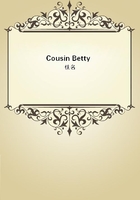
第9章
A wife's affection for her husband and the respect she pays him are infectious in a family. Hortense believed her father to be a perfect model of conjugal affection; as to their son, brought up to admire the Baron, whom everybody regarded as one of the giants who so effectually backed Napoleon, he knew that he owed his advancement to his father's name, position, and credit; and besides, the impressions of childhood exert an enduring influence. He still was afraid of his father; and if he had suspected the misdeeds revealed by Crevel, as he was too much overawed by him to find fault, he would have found excuses in the view every man takes of such matters.
It now will be necessary to give the reasons for the extraordinary self-devotion of a good and beautiful woman; and this, in a few words, is her past history.
Three brothers, simple laboring men, named Fischer, and living in a village situated on the furthest frontier of Lorraine, were compelled by the Republican conscription to set out with the so-called army of the Rhine.
In 1799 the second brother, Andre, a widower, and Madame Hulot's father, left his daughter to the care of his elder brother, Pierre Fischer, disabled from service by a wound received in 1797, and made a small private venture in the military transport service, an opening he owed to the favor of Hulot d'Ervy, who was high in the commissariat.
By a very obvious chance Hulot, coming to Strasbourg, saw the Fischer family. Adeline's father and his younger brother were at that time contractors for forage in the province of Alsace.
Adeline, then sixteen years of age, might be compared with the famous Madame du Barry, like her, a daughter of Lorraine. She was one of those perfect and striking beauties--a woman like Madame Tallien, finished with peculiar care by Nature, who bestows on them all her choicest gifts--distinction, dignity, grace, refinement, elegance, flesh of a superior texture, and a complexion mingled in the unknown laboratory where good luck presides. These beautiful creatures all have something in common: Bianca Capella, whose portrait is one of Bronzino's masterpieces; Jean Goujon's Venus, painted from the famous Diane de Poitiers; Signora Olympia, whose picture adorns the Doria gallery; Ninon, Madame du Barry, Madame Tallien, Mademoiselle Georges, Madame Recamier.--all these women who preserved their beauty in spite of years, of passion, and of their life of excess and pleasure, have in figure, frame, and in the character of their beauty certain striking resemblances, enough to make one believe that there is in the ocean of generations an Aphrodisian current whence every such Venus is born, all daughters of the same salt wave.
Adeline Fischer, one of the loveliest of this race of goddesses, had the splendid type, the flowing lines, the exquisite texture of a woman born a queen. The fair hair that our mother Eve received from the hand of God, the form of an Empress, an air of grandeur, and an august line of profile, with her rural modesty, made every man pause in delight as she passed, like amateurs in front of a Raphael; in short, having once seen her, the Commissariat officer made Mademoiselle Adeline Fischer his wife as quickly as the law would permit, to the great astonishment of the Fischers, who had all been brought up in the fear of their betters.
The eldest, a soldier of 1792, severely wounded in the attack on the lines at Wissembourg, adored the Emperor Napoleon and everything that had to do with the /Grande Armee/. Andre and Johann spoke with respect of Commissary Hulot, the Emperor's protege, to whom indeed they owed their prosperity; for Hulot d'Ervy, finding them intelligent and honest, had taken them from the army provision wagons to place them in charge of a government contract needing despatch. The brothers Fischer had done further service during the campaign of 1804. At the peace Hulot had secured for them the contract for forage from Alsace, not knowing that he would presently be sent to Strasbourg to prepare for the campaign of 1806.
This marriage was like an Assumption to the young peasant girl. The beautiful Adeline was translated at once from the mire of her village to the paradise of the Imperial Court; for the contractor, one of the most conscientious and hard-working of the Commissariat staff, was made a Baron, obtained a place near the Emperor, and was attached to the Imperial Guard. The handsome rustic bravely set to work to educate herself for love of her husband, for she was simply crazy about him; and, indeed, the Commissariat office was as a man a perfect match for Adeline as a woman. He was one of the picked corps of fine men. Tall, well-built, fair, with beautiful blue eyes full of irresistible fire and life, his elegant appearance made him remarkable by the side of d'Orsay, Forbin, Ouvrard; in short, in the battalion of fine men that surrounded the Emperor. A conquering "buck," and holding the ideas of the Directoire with regard to women, his career of gallantry was interrupted for some long time by his conjugal affection.
To Adeline the Baron was from the first a sort of god who could do no wrong. To him she owed everything: fortune--she had a carriage, a fine house, every luxury of the day; happiness--he was devoted to her in the face of the world; a title, for she was a Baroness; fame, for she was spoken of as the beautiful Madame Hulot--and in Paris! Finally, she had the honor of refusing the Emperor's advances, for Napoleon made her a present of a diamond necklace, and always remembered her, asking now and again, "And is the beautiful Madame Hulot still a model of virtue?" in the tone of a man who might have taken his revenge on one who should have triumphed where he had failed.